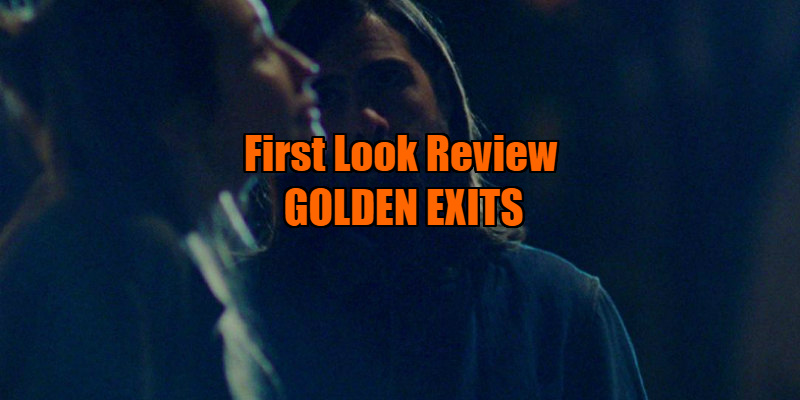
A young Australian woman's arrival upsets the intersecting lives of a group of insecure New Yorkers.
Review by Eric Hillis
Directed by: Alex Ross Perry
Starring: Emily Browning, Jason Schwartzman, Chloë Sevigny, Adam Horowitz, Mary-Louise Parker, Analeigh Tipton, Lily Rabe, Kate Lyn Sheil

With its middle class New York milieu and a jazz inflected score by Keegan DeWitt, Alex Ross Perry's Golden Exits may draw simplistic comparisons with Woody Allen, but the filmmaker whose work it evokes most is Alan Rudolph. In Rudolph's best films - Welcome to L.A.; Remember My Name; Trouble in Mind; Choose Me - the intersecting lives of a group of people are thrown into turmoil by the arrival of an outsider.
In Perry's film the outsider is Naomi (Emily Browning), a 25-year-old Australian who moves to Brooklyn for a few months to take up a position assisting archivist Nick (former Beastie Boy turned naturally gifted actor Adam Horowitz), who is cataloguing the life of his deceased father-in-law, the former publisher of a literary magazine.

The idea of her husband spending eight hours a day in a cramped basement with an attractive young woman doesn't sit well with Nick's wife Alyssa (Chloë Sevigny), still struggling to trust him following an earlier instance of infidelity. The goading of Alyssa's acid-tongued sister Gwendolyn (Mary-Louise Parker), who is reluctantly funding Nick's project, doesn't help her insecurities.
Stuck in a big city with no real friends, Naomi looks up Buddy (Jason Schwartzman), a local Brooklynite whom she once met on a childhood trip to New York. Happily married to the adorable Jess (Analeigh Tipton), Buddy is uncomfortable at the forthright attitude of Naomi, and tells the Aussie that he can't spend time with her alone, but will do his best to introduce her to potential suitors.
As penned and pictured by Perry and rendered by Browning, Naomi is a captivating character, a ticking time-bomb whose awareness of her appeal to the opposite sex is offset by an innocent naivety. When we meet her first she's sitting on a brownstone stoop warbling a rendition of Russ Ballard's 'New York Groove', but her emotional poker face makes it unclear if we're witnessing the beginning or end of her Big Apple arc.

Through no fault of her own, Naomi's trip to America is doomed from the outset by the insecurities of the tightly knit group of locals she encounters. A couple of weeks into her arrival and Nick is drunkenly arriving on her doorstep late at night, throwing caution to the wind and potentially out the window with his marriage. It's as uncomfortable a scene as you could endure, our sympathy for the pathetic and misguided Nick tempered by the potential for male aggression. The ensuing glimpses of Nick and Naomi's irreparably damaged working arrangement are difficult to witness, the spurned older man barely looking up from his work when his assistant asks for permission to go to lunch.
Seeing the potential for damage, and perhaps motivated by jealousy for a young woman who reminds her of herself at that age, Gwendolyn imposes an impossible deadline on Nick's project in order to break up the pairing. Alyssa, unaware of how unattracted Naomi really is to her pathetic husband, becomes so riddled with paranoia it begins to negatively affect her career as a therapist.
Perhaps the most fascinating dynamic is that shared between Naomi and Buddy, the latter breaking his self-imposed rules of avoiding the former as he continually sneaks away from his wife to spend time with the Aussie, pushing 'platonic' as far as any definition of the word will allow. His motivations are debatable - is he hoping to succumb to Naomi's obvious charms or using her to test the strength of his resolve and his relationship with Jess?

Perry doesn't give us any easy answers to the questions raised by his characters' complexity. Eschewing the traditional tropes of the ensemble drama, Perry allows his characters to run away from him, and he's commendably uninterested in having them learn any trite life lessons. Naomi's presence doesn't damage their lives, rather it merely exposes the fragility they've kept hidden away until her arrival.
"People never make films about ordinary people who don’t really do anything," Naomi moans to Nick in an early discussion on her cinematic tastes. Of course, plenty of filmmakers do exactly that, but few can make ennui as enthralling as Perry does here. The magnum opus of Perry's still relatively burgeoning career, Golden Exits is a film about ordinary people who don't really do anything, and watching their inaction is as beguiling as cinema gets.

A UK/ROI release has yet to be announced.

